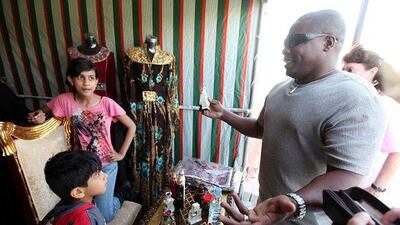ABU DHABI // "This is more than a community market," Fatima al Harmoudi said, standing outside a tent that displayed an array of her designs. "This is a way to promote our culture and learn about other cultures." Ms al Harmoudi is one of dozens of merchants expected over the coming days to display everything from textiles to food at the Community Market in Khalifa Park.
Organisers hope that her enthusiasm will attract more merchants - and buyers. The 40-day event is organised by Abu Dhabi Municipality as "a platform where the participating families can exhibit a diverse range of products and homemade items", according to statement from the municipality. It includes a theme park with rides and entertainment for children, a cultural village, live music and shows. The Abu Dhabi Department of Economic Development has 21 tents which are given free of charge to local women to display and sell their crafts. For others, tent rental costs Dh12,000 (US$3,300) for the duration. None of the rental tents had been set up as of yesterday evening, and there were fewer than a dozen tents in total.
"For women who don't have the time or money to run a full-time shop, this is a great initiative," said Umm Mohammed al Mansouri. In the coming weeks, Mrs al Mansouri will be selling food that she prepares herself. "This helps us introduce our culture to the many nationalities that live here," she said. To encourage local women to take part in these cultural events, the city gives them a special permit and licence to use their homes for cooking.
Mrs al Mansouri will be selling a local dish known as harees, which consists of meat, wheat and salt. "I am a full-time mother and housewife," she said. "This is my hobby and a good way for me to help bridge the different cultures here. I am doing this mostly for other cultures to taste our food." Ms al Harmoudi, a Sharjah-based designer and tailor of shailas and abayas with accents aimed at "spreading the culture", had the same aim for her garments.
"When I design these, I think of how they can be attractive for my American and European friends. We are not just here to sell to our own people," she said. For the few tourists roaming from one tent to the next, the "market is a great opportunity to find things that you do not get from the local shopping malls", Cindy Albeajali said. Together with her husband, Jacob, she said she came to meet people from other cultures. Although she was disappointed that very little had been completed yesterday at the market's official 4pm start, Mrs Albeajali said: "This will be great once it is completely set up."
For Bill Clayton, who has been in the country for only three months, it was a cultural experience. "This is a great way to bridge the gap and buy a few things," he said as he bragged about the new tablecloth and tea-cover set he had just purchased. Organisers said the event, sparsely attended on its first day, was just a "soft launch". "By the end of the week, everything will be ready," a representative said.
The Community Market will run until April 30 from 4pm to 10pm on weeknights and will remain open until midnight on weekends. myoussef@thenational.ae

